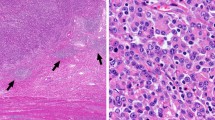Summary
To study the biopathological characteristics of the transitional mucosa adjacent to rectal carcinoma, 34 cases were subjected to mucin histochemical and immunohistochemical study to observe the expression of p53 and p21 protein in distal mucosa adjacent to rectal carcinoma and its relationship to the mucin change. The expression of p53 protein was found in 29.4 % (10/34) of distal transitional mucosa in the cytoplasm of goblet cells, and its positive staining was within 4 cm from carcinoma margin. All p53 positive mucosa was transitional mucosa. Overexpression of p21 protein was found in 26.5 % (9/34) of distal transitional mucosa in cytoplasm of crypt cells, and its positive staining was within 2 cm from carcinoma margin. There was no relationship between the expression of p53 and p21 protein in carcinoma and that in transitional mucosa (P > 0. 05). These findings indicated that there was aberrant alteration of p53 and p21 genes in transitional mucosa adjacent to colorectal carcinoma, which provided further evidence that transitional mucosa was an unstable pre-cancerous change. The aberrant mucin change and genetic alteration in distal mucosa of rectal cancer is within 4 cm.
Similar content being viewed by others
References
Flipe M I. Value of histochemical rections for mucosubstances in the diagnosis of certain pathological conditions of the colon rectum. GUT, 1969, 10:577
Dawson P M. Mucosal field change in colorectal cancer. Am JSurg, 1987, 153:281
Laurent-puig P, Olschwang S, Delattre Oet al. Association of Ki-ras mutation with differentiation and tumor formation pathways in colorectal carcinoma. Int Cancer, 1991, 49:220
Connelly J H, Bruner J M, Robey-Cafferty S Set al. p53 protein expression in transitional mucosa and adenocarcinomas of the colorectum. Mod Pathol, 1992, 5(5):537
Baytner S, Mitmaker B, Gordon P Het al. Immunohistochemical expression of mutant p53 oncogene in transitional mucosa adjacent to human colon cancer. Clin Invest Med, 1993, 16(5):379
Sun X F, Carstensen J M, Zhang Het al. Prognostic significance of cytoplasmic p53 oncoprotein in colorectal adenocarcinoma. Lancet, 1992, 340:1369
Hanski C, Bornhoeft G, Shimoda Tet al. Expression of p53 protein in invasive colorectal carcinomas of different histologic types. Cancer, 1992, 70:2772
Grand R J A, Owen D. The biochemistry of ras p21. Biochem J, 1991, 279:609
Author information
Authors and Affiliations
Rights and permissions
About this article
Cite this article
Maohui, F., Feng, P., Guoliang, Y. et al. Expression of p53 and p21 protein in transitional mucosa adjacent to rectal carcinoma and its clinical implication. Current Medical Science 20, 220–221 (2000). https://doi.org/10.1007/BF02886996
Received:
Published:
Issue Date:
DOI: https://doi.org/10.1007/BF02886996




